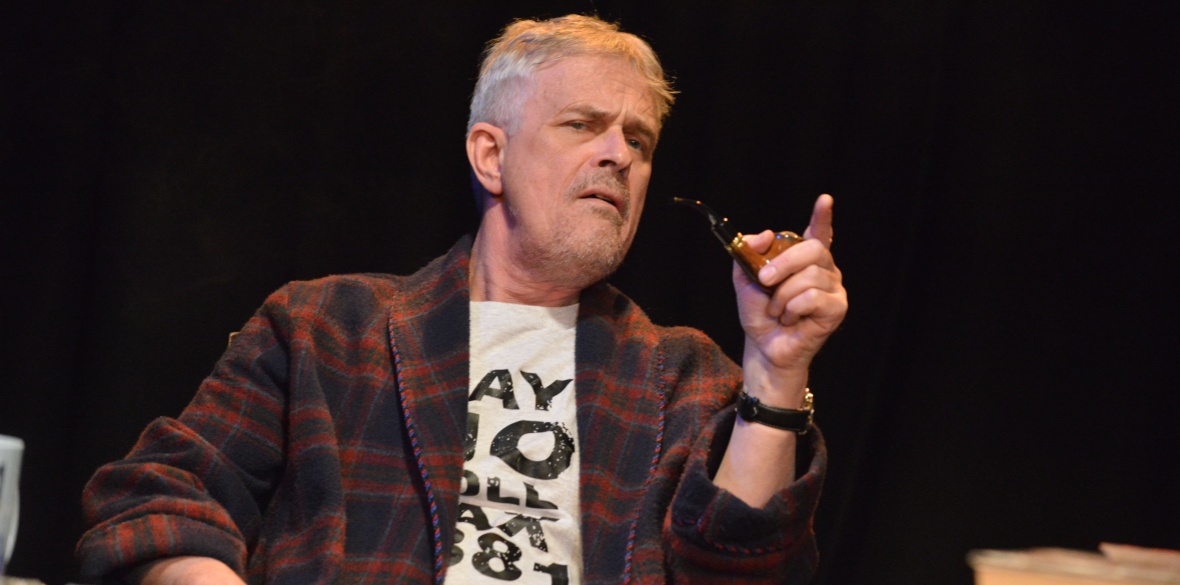This is the last article you can read this month
You can read more article this month
You can read more articles this month
Sorry your limit is up for this month
Reset on:
Please help support the Morning Star by subscribing here
FANATICAL diarist though he was, it’s somehow fitting that Tony Benn chose to tape his recollections rather write them down — there was, after all, no better way for the remarkably gifted orator to record his thoughts for posterity.
Those dispatches from the front line of the British left, spanning some six decades and more, constitute a monumental archive of listening pleasure.
They’ve recently been left to the nation by the Benn family as part of an inheritance tax settlement — I’m not entirely sure whether he would have approved of their motivation for doing so, but hey-ho — and they’ve inspired Andy Barrett to pen Tony’s Last Tape, a play in which the firebrand socialist, reflecting on a lifetime of political struggle, records his valedictory cassette.
After its debut at Nottingham Playhouse in 2015, it’s been touring to enthusiastic audiences and critical acclaim nationally, and it’s about to hit London at the Omnibus theatre in Clapham.
Opportunities worth taking rarely come without their challenges and Barrett faced the formidable task of reading all nine volumes of Benn’s transcribed diaries before offering a convincing retrospective.
For Philip Bretherton, who has the somewhat daunting job of invoking Benn on stage — “I don’t look like him, I don’t sound like him and I’m not the age he is in the play” — it’s a case of “asking the audience to use their imaginations to get as closely as possible to an accurate portrayal.”
This is where the substance of Barrett’s text, interwoven as it is with Benn’s actual words, surely gives the performance convincing rhetorical force. Benn’s skill as a public speaker, his way of “saying something authentic in a way that grabs people’s attention” comes into its own.
“The guy knew how to tell a joke,” says Bretherton, a skill noticeably absent among most of today’s politicians, whose woeful attempts at humour — think the Maybot’s excruciating “dance” to Abba at the Tory Party conference last autumn — often crash and burn.
A sense of humour was probably essential for a man who, on inheriting his father’s peerage, was automatically expelled from the House of Commons and had to grapple with the absurdities of the British state in order to get back in again.
“Getting rid of his peerage made him realise the lengths to which the Establishment was prepared to go in order to preserve itself,” Bretherton says.
That’s perhaps why Benn went beyond the call of duty in honouring those who rocked the ship of state and the play recalls the time he and Jeremy Corbyn sneaked about the Palace of Westminster after hours in order to commemorate Emily Wilding Davison — the suffragette who stayed in Parliament on the eve of the 1911 census in order to record it as her address — by putting up a plaque in the broom cupboard in which she hid.
Bretherton maintains that Benn’s passionate belief that “you’d be measured by your contribution to what you believe in,” may in part explain his formidable industriousness. “The guy just worked,” Bretherton says admiringly. “Between April 1972 and March 1973 he wrote 5,011 letters and gave over 230 speeches.”
Interestingly, some of Benn’s most famous and often quoted words: “There is no final victory, there is no final defeat. Just the same battle to be fought over and over and over again,” have been augmented in the production, with Barrett adding: “So toughen up, bloody toughen up” at the end.
Much to the writer’s surprise, his appendix was swiftly adopted as an authentic Bennism and it’s been uttered at rallies, shared on Twitter and printed on mugs and T-shirts. High praise indeed but Bretherton is eager to remind me that — in spite of being called “the most dangerous man in Britain” by the gutter press — Benn was, at heart, a sentimental soul.
“He always cried at the Durham Miners’ Gala, he bought the park bench on which he proposed to his wife [placing it in their garden] and his favourite film was The Railway Children.”
Full of praise for the man whose ardour didn’t dim with age and who encouraged generations to fight the good fight, and whose spirit lives on in their deeds, Bretherton simply asks: “Will we see his like again?”
Tony’s Last Tape runs at the Omnibus Theatre from April 2-30, box office: omnibus-clapham.org.











